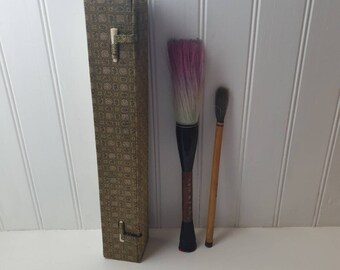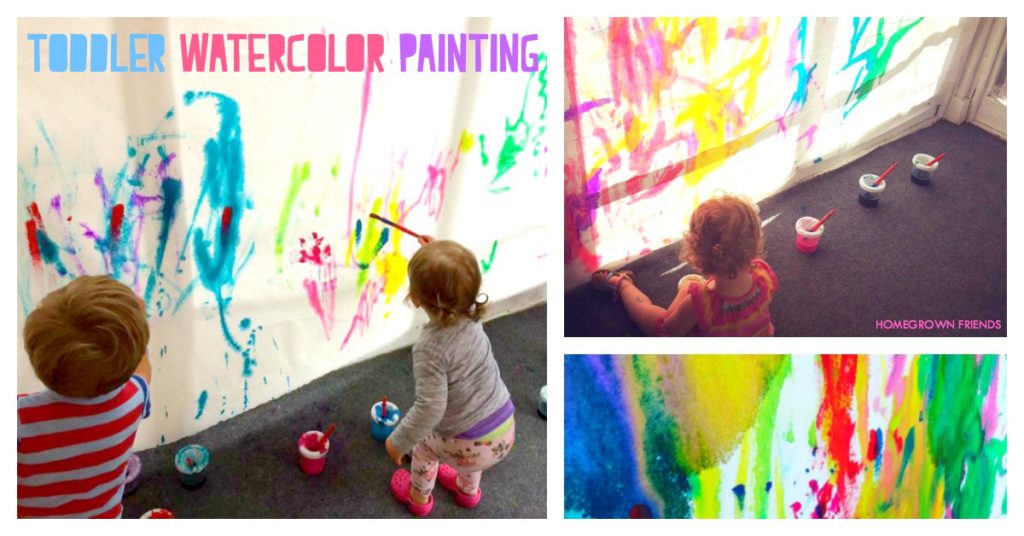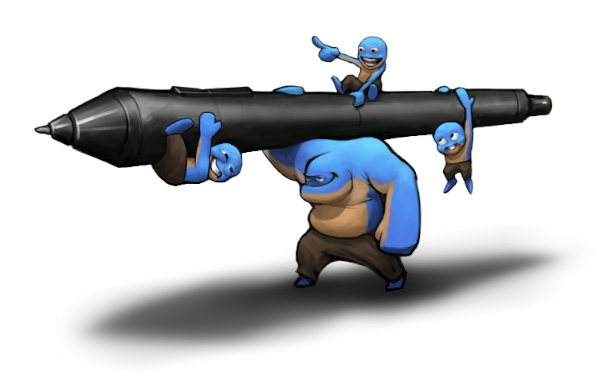Mural and Oversize Brushes. Whatever your media, technique, or vision, Blick has the perfect brush for the job. Large-scale art such as murals, frescoes, stage scenery, street art, and other art painted on a grand scale require big paintbrushes, and Blick has the brushes for doing your best work. Aug 14, 2015 The Paint Brush Cover is the newest addition to my painting tool box. Sal emailed me about half a dozen times to try to get my attention about the Paint Brush Cover. (Yup, if you don’t get a reply from me right away, try try again.) I’m so glad he was persistent because I love this painting accessory.
These large calligraphy brushes will all maintain a fine point when wet, and may be used for both Sumi-e painting and writing Chinese calligraphy characters. Each brush is hand crafted to meet the demanding requirements of professional artists.
The Interlocking Hog Bristle series is one of our finest brush lines, and the finest hog bristle you'll find. The very best craftsmanship goes into each brush, from the top-quality, hand selected white bristle to the accent of gold on the tip of the matte-black handles. Apr 14, 2014 - Pottery Barn Knock-off Giant Paint Palette and Brush, how to make your own out of vinyl, wood, and a broom!
This is a professional artist quality Chinese calligraphy brush made with soft natural sheep hair bristles and a cattle horn…
A large Chinese calligraphy brush made with all natural materials including a cattle horn handle and bear hair bristles.…
Beautiful Cattle horn was used to make this natural bear hair bristle calligraphy brush perfect for writing very large Chinese…
This large Chinese calligraphy brush has a very solid feeling engraved wood handle and bristles made using very good quality…
Giant Paint Brush Prop
A large Chinese calligraphy brush made using cattle ear hair, which makes a very nice brush that is quite easy…

Bear hair bristle calligraphy brushes are very popular with Chinese artists as they are fairly stiff providing good control when…
A large calligraphy brush with bear hair bristles and a very solid and beautifully designed wood handle with a great…
Cattle hair bristles and a bamboo handle were used to make this large Chinese calligraphy brush designed to write characters…
A large calligraphy brush made with cattle hair bristles and a natural bamboo handle. This brush is excellent for Chinese…
Large Chinese calligraphy brush made using natural hair and a bamboo handle. This Chinese calligraphy brush is very well suited…
A large sheep hair Chinese calligraphy brush with a very long tip, which is very well suited for writing calligraphy…
This large Chinese calligraphy brush has mixed hair bristles and an attractive natural bamboo handle. A large Chinese calligraphy brush…
This large Chinese calligraphy brush is made using mixed hair bristles and an all natural cattle horn handle. The bristles…

One of the finest large calligraphy brushes we have ever offered, its superior quality makes it best suited for professional…
A large Chinese calligraphy brush made using fine sheep hair bristles and a natural bamboo handle.…
A beautifully designed, solid feeling Chinese calligraphy brush made with sheep hair bristles and wood/cattle horn handle.…
A large Chinese calligraphy brush made using soft sheep hair bristles and a bamboo handle. This is a good quality…
This large Chinese calligraphy brush is easily one of the finest art brushes you will ever use. It is hand-made…
A very large Chinese calligraphy brush made with Yak hair, which is fairly stiff and produces a rather course brush…
This large Chinese calligraphy brush is made with a core of stiffer pony hair, surrounded by softer sheep hair bristles,…
To date, my blogs have been about my experiences as an Israeli-American who’d returned to Israel in 2011. I recently dug up a story I wrote about my family and the Lebanon War of 2006, while we were visiting and building our new home in Kfar Tavor. Much has changed since, and little has changed since. The story was picked by a Jewish publication.
2006:
Picture this: A hot summer afternoon in Kfar Tavor, a small village in Northern Israel. I’m sitting on our rooftop deck in our just completed new home. The easterly wind so typical of the Lower Galilee blows amidst the rows of olive groves, bending the tree branches in every direction. Vineyards stretch to the hillsides. My twin daughters, Maya and Romy, age 8, are playing downstairs with their new Israeli friends. My wife Pnina had just returned from the market and will soon join me to a cup of Turkish coffee. It was during this seemingly idyllic setting that I asked myself: What were our chances of being struck by a Hezbollah rocket?

That question crossed my mind as the war raged for three weeks against the Hezbollah with no end in sight. Only yesterday, the number of rockets that slammed the Tzafon, the North, reached the three-thousand mark. But still, to any reasonable man the odds of being hit by a rocket were as remote as claiming a winning Lotto ticket. A handyman who was busy putting the final coat of paint to our new kitchen quickly dispelled my sense of calm. “No one buys 150 lottery tickets per day,” he said, waving his paint brush at me, referring to the daily deluge of rockets that rained down on Galilee. That statistic was unsettling but I wasn’t ready to panic just yet. I wanted to replace panic with cold, hard facts. Being a geography graduate from the University of Tel Aviv some thirty years earlier afforded me some tools unavailable to the average Joe, or here, in Israel, to the average Yossi. A quick lookup in the atlas confirmed what we all know: Israel is small, about half the size of San Bernardino County. Pencil in hand, I circled the map of Galilee, noticing that the region comprised one-third of Israel’s land. My confidence suddenly slipped.
The Israeli media aggravated our already frazzled nerves. Days earlier, cameramen had swooped down over Nahariya, an otherwise quaint resort town on the Mediterranean. A direct rocket killed a woman instantly while she sat in her penthouse balcony. Pictures of the attack were splashed in newspapers. Red was the dominant color. Each day, it seemed, the red spilled further and further south, closer and closer to our home. Kfar Tavor, 45 miles from the Lebanese border, had become the frontier. Execute unity build on mac but for windows. Fighter jets streaked the sky on their way to Lebanon. The drone of the Apache helicopters above was omnipresent during all hours of the day, ferrying soldiers and materiel to the battlefront.
My daughters didn’t ask questions. They didn’t need to. War permeated every room, every conversation, and every funeral. They soaked up the war from the TV monitor in my sister-in-law’s living room, from hearing about the Hezbollah from the anchorman, from the front page pictures of the dead and maimed, from their friends, and from sensing our disquiet. They knew their vacation in Israel was different, like no other they’d experienced during their young lives.
The summer camp shut down abruptly. School buses idled in parking lots. My daughters gazed through the padlocked gate and the chain link fence that surrounded the community swimming pool. A sign read: “Due to the situation, pool is closed until further notice.” They didn’t ask. They knew.
During a brief lull in the fighting, I piled the girls into the car, packed their bathing suits, slathered their faces with sun-block, and drove ten minutes to a neighboring village which chose to keep its swimming pool open, ignoring strict directives from the military to keep people from assembling in any one place. The pool swelled with kids and their parents. Beach balls skipped over the water. I stretched on a comfortable lawn chair, watched my girls jump off the diving boards; I watched them lick ice cream cones while the amplified radio played a Rolling Stones classic, the sound of the electric guitar aching. Overhead, Apache helicopters, resembling giant grasshoppers, thumped in a northerly direction. For a moment, it felt as if I were a character in the movie Apocalypse Now. Out in the open and without cover, I gambled in a game of Russian Roulette, or Hezbollah Roulette. Now, in retrospect, I acted recklessly. Then, it was escapism, if only for a day. Then, it was not to deprive my daughters of the summer vacation we had promised them.
Gambling with our lives seemed ordinary. Rockets fell everywhere and people went about their business. Many ignored sirens and bomb shelters. This was doubly true of the elderly. They’d seen greater calamities in the past. Rockets weren’t going to change their calendar. Case in point: at the grocery store I pushed my shopping cart past an old man with a cell phone attached to his ear. The person on the other end informed him of a fatality in Haifa. A rocket struck a driver, incinerating his vehicle. I could see the horrific news affected the man. He covered his eyes and shook his head in disbelief. He then reached for a coffee can off the shelf and said into the mouthpiece, “That’s terrible, terrible. Listen, they have a two-for-one special on Brazilian coffee, should I get some?”
Life went on.

In time, everyone told stories of almost being hit by a rocket. They were either on their way to a shop or an office minutes before or after rockets had landed. Miracles abounded. I had one of my own. The doors in our new house were missing door handles. I climbed into my sister-in-law’s car and we drove twenty minutes from Kfar Tavor to Nazareth. Nazareth’s vibrant Jewish, Moslem, and Christian communities drew people from far and wide for generations. To Nazareth you went if you wanted to repair your car on the cheap, to buy gold jewelry, spices, or in my case, door handles. Once done with our shopping in Nazareth we dined at a local Arab-owned restaurant. We complimented the owner-chef on the fine humus and fluffy pita bread. We returned home. Two hours later I learned a Hezbollah rocket exploded a half-mile away from the restaurant in a courtyard where children were playing soccer. The rocket killed two young Arab brothers. That night, Nasarallah of the Hezbollah labeled the dead children as Shaids, martyrs. That night, my head on the pillow, I realized half a mile was a close call. I turned over and slept.
The next morning an Israeli-Arab laborer was to lay tile in our guest bathroom. I watched him measure and cut the tile. It didn’t take long for the conversation to veer into politics. “As Arab-Israelis, we’re screwed,” he said and drew a deep puff from his Marlboro. I didn’t respond right away. I gave him space. “You see,” he continued, “The Arabs in Lebanon, in Jordan, in Syria – they all regard us as traitors. We live inside a Jewish state with Jews.” He put out his cigarette. “On the other hand,” he said, “all the Israelis think of us as collaborators, as Hezbollah sympathizers. Either way, we lose.” He then made mention of the two young Arab boys who were killed indiscriminately by Hezbollah in Nazareth. He said: “Our blood is as red as yours.”
When he left, I climbed on the rooftop. The Galilee population is 50% Moslem and Christian, 50% Jewish. From my vantage point I could see Arab villages hug the hillsides. Shepherds led their grazing sheep up the slopes. The cries of the muezzins from the mosques over the loudspeakers sliced the air several times a day, calling the believers to prayer. Whether we wanted it or not, the lives of the Arab-Israelis and the Jews were intertwined.
And the rockets kept coming. Huddled on the floor inside our bomb shelter with Pnina, Maya and Romy, our eyes squinting in the dark, staring at the steel trap door and steel-plated window, sucking air from the vent that led to the outside world, I said to Pnina in code language: Did you hear the boom of the “Tet – Yod – Lamed?” Forgetting completely that the girls had learned Hebrew at Adat Ariel in first grade, Romy stood up and shouted, “Abba, you said TIL, — that’s Tet – Yod – Lamed — That means ROCKET. Did a rocket fall on our house?”

No, it didn’t. The tail of a rocket malfunctioned in mid-flight and fishtailed to the ground about a mile away.
Every day the names and pictures of the fallen soldiers and civilians were shown on television and in the papers. Grief suffocated the nation. We spoke of nothing else. Then grief gave way to anger. Israel wasn’t used to protracted wars, to such high casualties. Israel’s military supremacy was never in question, but with each passing day, victory became elusive. Finger-pointing dominated the airwaves. Everyone was a general. We all asked the same question: How could Israel have allowed the Hezbollah to build its war machine? As if to mock us, every time Israel upped the ante, dropped more bombs, and turned Lebanese villages to rubble, the Hezbollah slammed Galilee even harder.
If an army marches on its stomach, it took but one phone call in Kfar Tavor to enlist the women in the village. Within minutes my wife Pnina jumped in the car and came back with enough groceries to feed Napoleon’s army. She toiled in the kitchen for hours. Juicy meatballs materialized in no time. Plump chickens filled pots. Coffee cakes rose in the oven. Hours later the women assembled at the main square of the village and a long convoy of cars snaked its way north, to feed soldiers just across the Lebanese border.
The war affected Israel disproportionately. In the north, thousands lived around the clock inside ill-equipped, neglected and smelly public bomb shelters. Shopping malls resembled ghost towns. Theaters were empty. Restaurants begged for diners. Thousands fled to relatives and friends to the south. Tel Aviv, beyond the rockets’ range, belonged to another planet. People there continued to frequent the cafes, to work on their beach tan, and to fill the night clubs. Such was the case when we packed an overnight suitcase and drove the two-hour ride to Tel Aviv to attend my niece’s Bat Mitzvah celebration. I feared we’ll witness nothing but empty tables and a teary-eyed twelve-year old. Who in his right mind wanted to attend a Bat Mitzvah in the middle of the war? I was wrong. Two hundred guests feasted, laughed, and danced. Unlike the Hezbollah that chose death, we, as Jews embraced life.
The next morning we couldn’t return to Kfar Tavor, our home. The war escalated to new levels. Rockets pummeled Galilee. Cars clogged up the highways leading south. No one dared head north. “I want to go home,” I told my father in his apartment overlooking the Mediterranean. “What? Are you nuts? Stay with us for a few days,” he said.
Large Paint Brush
“I don’t have a change of underwear? “ I told him.
“Use mine, then,” he laughed. “It’s war time.”
The following day I accompanied my father to a Yad Vashem satellite museum near Tel Aviv. The museum’s director invited my father to give firsthand testimony of his days in the Bergen-Belsen Concentration Camp as a boy. The museum was to document my father’s incarceration on video and to archive the DVD at Yad Vashem in Jerusalem. During the three hours I spent in the studio with my father, the present did not exist. The Hezbollah was off limits. I only heard of his days in the camps, of his subsequent Aliya to Israel as a holocaust survivor, of farming on a kibbutz, and of his fighting the Arabs during Israel’s War of Independence in 1948. Once the interview ended, we stepped out into the sun, and into the present. Sitting in the back of a taxi, he said, “What do you say we take the grandchildren to the beach this afternoon?”
Life went on.
Coincidentally, the cease-fire went into effect during our last day in Israel. Israel and Hezbollah fought it out for more than a month. Now they removed their boxing gloves without a clear winner. They were both bloodied.
In the evening, the taxi pulled up to our house. We drew the shades down over the windows, locked up, and strapped the many suitcases on the roof of the cab. We were going home, this time to America.
A sudden explosion startled us. How to use onedrive app on macnewpb. “Did the Hezbollah violate the ceasefire already?” I asked the driver as to where the rocket might have landed. “The Arabs,” he said, and pointed to the source of the mesmerizing display of red, yellow, green, and white fireworks igniting the night sky. “They’re celebrating a wedding; they’re going to sing and dance till dawn.”
Such was the case in the Middle East. Life and death mixed.
As we neared the airport on Highway 6, the latest addition to Israel’s freeways, I saw an enormous truck on the right lane struggling to pull its load. The cab sped up until we were even alongside the giant flatbed. The cargo was covered with camouflaged netting. As if reading my mind, the driver said,” It’s a damaged tank. It took a hit in Lebanon.”
I rolled down the window. The netting on the truck flapped erratically in the wind, revealing the body of the tank, much like a doctor pulling back the bed sheets to reveal the patient. Israel was hurt. But just like the tank that will be nursed back to health, so Israel will recover, gain strength, and learn its lessons.




